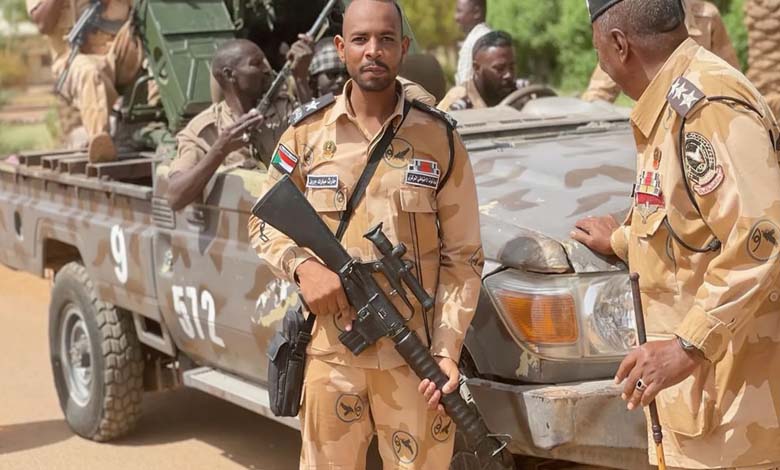Postponed Clash in Sudan: A Brewing Battle for Power and Loyalty Between the Army and Its Allies

In a country devastated by war, a new confrontation looms — not between traditional foes, but among supposed allies sharing the same trenches.
Khartoum, still recovering from the ravages of conflict, now finds itself shaken by internal tensions. As humanitarian efforts seek to repatriate displaced civilians, a quiet but intense power struggle unfolds in the capital: a contest for influence and control between the Sudanese army and the so-called “joint forces” allied with it.
-
How the Sudanese Judiciary Became a Tool for the Muslim Brotherhood… with Names
-
Sudan: The Muslim Brotherhood Attempts to Infiltrate the National Umma Party
Despite official rhetoric calling for “a return to normal life,” fears are growing that Khartoum may become the next battleground of an internal rift.
Major Mohamed Nour Abu Khalaf, Secretary-General of the Central Command of Retired Sudanese Officers, painted a grim picture of the relationship between the army and its joint allies who fought alongside it against the Rapid Support Forces (RSF).
According to him, the alliance was never based on mutual trust but born out of military necessity — a temporary arrangement now threatening to unravel.
-
Al-Burhan Reshuffles Ministries by Force: A New Power Grab Threatens Sudan’s Peace Process
-
Between the Army and the Muslim Brotherhood: Why Do Peace Efforts Fail in Sudan?
A Fragile Alliance on the Ashes of Darfur
Abu Khalaf explains that current tensions stem from long-standing grievances, especially after four Darfur states slipped from army control, and El-Fasher remains besieged by RSF forces.
Despite aerial support from the army, the joint forces failed to break the siege, leading to distrust. This has fueled demands from within the army — notably among Islamist-aligned officers — to remove these forces from Khartoum and other reclaimed areas.
Pressure is also mounting from central, eastern, and northern provinces, where leaders accuse the joint forces of seeking control over national resources.
Meanwhile, leaders of the joint forces feel sidelined and demonized, despite having engaged in front-line combat since April 2023.
-
Power and Influence Struggles: Infighting Rocks Sudanese Army Alliances
-
With a Major Arms Deal for the Sudanese Army.. Brotherhood Leader Salah Gosh Returns from the Shadows
Evacuating Khartoum: A Divisive Decision
On July 18, army chief Abdel Fattah al-Burhan announced a two-week deadline to remove all armed groups from Khartoum. Though framed as a step toward civil restoration, the decision sparked controversy, particularly among the joint forces who claim they were neither informed nor consulted.
Even with a committee established under Sovereignty Council member Ibrahim Jaber, doubts remain about the real motives. Local reports indicate recent security breaches in parts of Khartoum and Omdurman, allegedly involving individuals from the joint forces.
-
Rapid Support Forces Warn of Islamist Threat to Sudan’s Unity
-
Islamic Militias in Sudan Carry Out Horrific Ethnic Cleansing in Al-Khuwai and Al-Hammadi
Joint Forces Reject Marginalization
Mini Arko Minawi, leader of the Sudan Liberation Movement and overseer of the joint forces, stated the decision had not been communicated officially. The three battalions deployed in Khartoum, he said, received no orders for withdrawal.
To counter allegations of civilian abuse, the joint command released photos of two individuals arrested for impersonating force members and committing crimes. They were handed over to military intelligence for prosecution.
-
Sudan Shaken by Retirees’ “No”: A Voice from the Army Rises Against War and Chemical Weapons
-
Sudanese Army Soldiers and Islamist Militias Accused of Looting Homes and Assaulting Civilians
Loss of Control and Political Ambition
Abu Khalaf believes the army has lost control over some allies, many of whom are now pursuing political and economic influence after gaining ground through military engagement.
He points out that these forces have recruited locally and assumed control over government revenues — evidenced by the Prime Minister’s failure to reclaim the Finance and Mining Ministries from armed groups in the last cabinet reshuffle in Port Sudan.
This expansion, he argues, reveals structural weaknesses within army leadership, which is now incapable of redefining its relationship with former battlefield partners.
-
Angry March in London Denounces Use of Chemical Weapons in Sudan
-
Sudan: Reliable Evidence Unveiled of Chemical Weapons Used to Kill and Maim Hundreds of Civilians Including Children in Darfur
Khartoum’s Coming Battle: A Delayed Inevitability
Abu Khalaf warns that Khartoum is nearing a breaking point, with an armed confrontation between the army and its allies becoming increasingly likely — particularly as the RSF still controls key areas in Darfur.
He concludes: “This clash has been delayed since the army re-entered Khartoum. The danger now is that internal tensions will trigger a breakdown, giving adversaries an opening.”
His final warning is stark: “The Muslim Brotherhood, still influential within the army’s leadership, may exploit this rift to deepen divisions — turning Khartoum, and all of Sudan, into a hostage of internal conflict to block any political settlement that could remove them permanently from power.”












